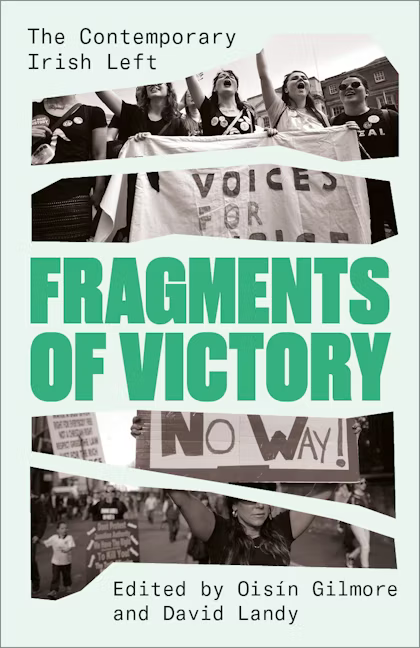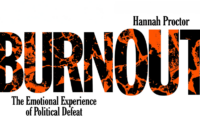Edited by Oisín Gilmore and David Landy, Pluto Press, 2024

Social movements and radical politics were largely marginal in Irish society when I was growing up in Donegal during the Celtic Tiger. Even the Shell To Sea campaign, important as it was, hadn’t really registered with me or anyone I knew. If you had told me in 2007 than even Donegal would have regular protests against Israeli genocide in Gaza, annual gay pride parades and the choice to vote for multiple leftist representatives such as PBP and Thomas Pringle in a general election by 2024, I’d have thought you were absolutely mad. But so it proved.
Irish society changed greatly in the time between the two great ruptures of the 21st century, namely the financial crash of 2008 and the COVID-19 pandemic in 2020. The gutting of state services in the aftermath of the bailout had a major effect across society, particularly on young people and the working class, many of whom were politicised in the 2010s. This book is a collection of essays written by activists and historians who were, for the most part, involved in movements such as the campaign against water charges or the Repeal the 8th campaign throughout this period.
These essays provide a comprehensive description of these movements, covering a wide range of subjects within a short space. This project provides an important space for the activists involved to share their stories and often share an interesting and illuminating account of the strengths and weaknesses of their efforts. The chapters on the housing activist movement and trade unionism provide a particularly strong and measured analysis to draw on and learn from.
The austerity policies adopted by the Irish state after 2008 have done untold damage to Irish society, and we are still in the midst of the worst housing crisis in modern Irish history across all 32 counties. The environmental catastrophe is getting worse every day. Whilst the left may be stronger and more visible than it was during the Celtic Tiger, it was so weak then that it had to organise from a very low starting point, often with practically no organisational base outside major cities. The contributions here acknowledge this transformation has been far from perfect and is in many ways, incomplete. There is much here about how the left has often failed to build sustainable and genuinely national movements and institutions (with the exception of CATU, which is active across all 32 counties, and PBP, which ran a candidate in almost every constituency in the last general election), with movements such as anarchism being in a much weaker position now than before.
Nevertheless, Landy and Gilmore maintain an optimistic tone, and it’s impossible to disagree that there have been major victories for activist movements since 2008, most obviously the defeat of water charges and repeal of the 8th Amendment.
It’s impossible for any book, let alone one of 204 pages, to fully cover such a diverse topic as the Irish left: this begs the question as to what stories a potential second volume could include. Austerity, emigration, and the housing crisis have disproportionately affected Gaeltacht communities and become a major existential threat to the survival of the Irish language. There’s been an explosion of radical anti-capitalist and anti-colonial Irish language activism such as Misneach, Glór na Móna and Banú across Ireland since 2008, and many of the major achievements within the Irish language movement in recent years have their roots in these efforts. A study of the evolution of radical media during this period would also be fascinating, as would the impact of the internet on the capacity of social movements in Ireland to organise (something touched on in several essays here, but understandably never quite explored in depth). Indeed, the recent turn of X and Meta towards openly embracing reaction is a worrying development for the left. Have the next generation already been lost to the far-right, and does the left have to admit socialism won’t be built on a screen by embracing alternative strategies of communication?
Fragments of Victory is an important and thought-provoking book that’s essential reading for anyone interested in how Irish society has changed since the crash of 2008 and in some respects, for the better. Perhaps it should be taken as a starting point for other movements which have emerged since 2008 to start telling their story and deepen our understanding of our turbulent moment.
Pádraig Mac Oscair is an activist and author from Donegal based in Dublin. His writing can also be read in Mionlach, An Páipéar and Shan Van Vocht.
Fragments of Victory : The Contemporary Irish Left (Edited by Oisín Gilmore and David Landy, Pluto Press, 2024) is available from Connolly Books, Temple Bar, Dubl





